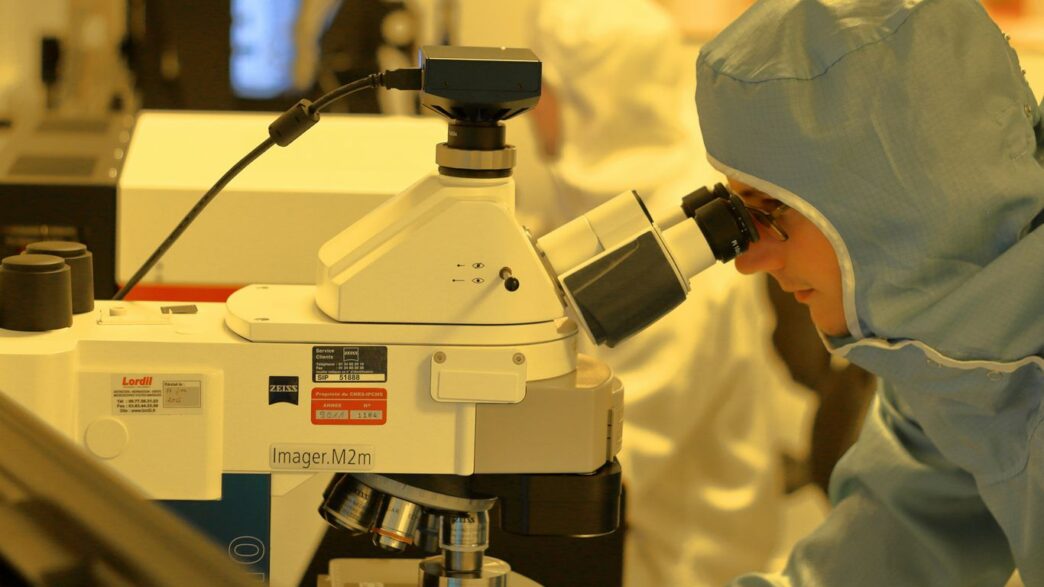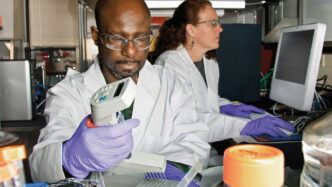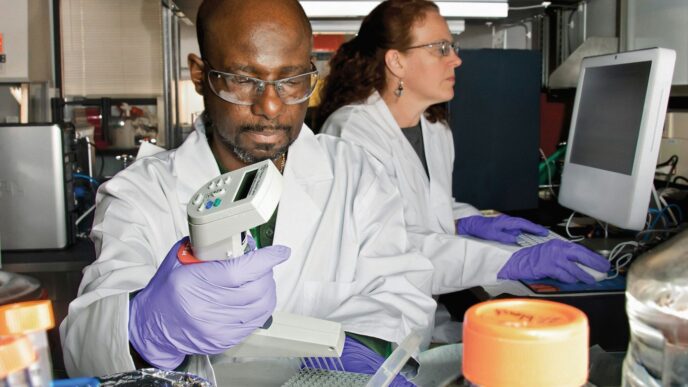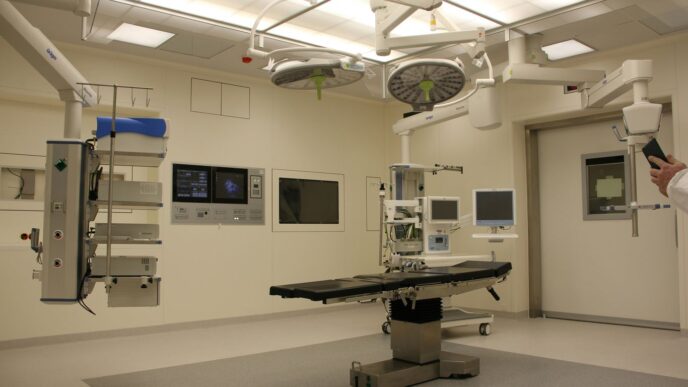Thinking about a career change or a step up in the biotech world? It’s a field that’s really growing, and getting some extra training can make a big difference. Many professionals find that a specialized certificate is just what they need to move into more senior roles. This article looks at some of the top online biotech certificate programs available for 2025, what you can learn, and what doors they might open for you. We’ll break down why these programs are a smart move for your career.
Key Takeaways
- Online biotech certificate programs offer focused training to help professionals advance in the growing life sciences industry.
- These programs can lead to higher salaries, with potential increases from mid-career averages to senior-level positions.
- Key specializations include bioinformatics, drug discovery, regulatory affairs, biomanufacturing, and quality assurance.
- Choosing a program involves checking the curriculum, faculty, and accreditation to match your career goals.
- Graduates can pursue roles like Senior Research Scientist, Quality Assurance Manager, Regulatory Affairs Specialist, Clinical Project Manager, and Bioinformatics Scientist.
Understanding the Value of Biotech Certificate Programs
The global life sciences market is growing fast, like an 11.75% increase each year. But even with all this growth, many people working in science feel stuck. You might have the skills for a bigger job, but a gap on your resume keeps you from getting that promotion. This is where an online biotechnology graduate certificate really shines. It’s like a specific key made to help you get past that roadblock and move up. This article is here to give you the facts so you can make a smart choice about your career future.
Benefits of Pursuing a Biotechnology Graduate Certificate
Getting an online biotech certificate can really change your career path. It gives you that specific credential you need to be considered for senior and management jobs in areas like quality assurance, regulatory affairs, and project management. Think about your paycheck, too. You could potentially move from a mid-career salary of about $57,000 to a senior-level salary of over $70,000. Plus, the online format is a big deal. It means you can pick up these important skills without having to quit your job or put your life on hold. It’s a way to get ahead without a major disruption.
Career Advancement Through Specialized Credentials
An online biotechnology graduate certificate offers a focused curriculum for people who already have a bachelor’s degree and some work experience. It’s not about repeating what you learned before; it’s about adding advanced, graduate-level courses that build on your existing knowledge. The programs are set up to be flexible, fitting around your busy schedule. The coursework focuses on the practical, hands-on skills that companies are looking for right now. This lets you improve your qualifications without hitting pause on your career. It’s a smart way to stay current in a fast-moving field. You can even stack the credits from a certificate program toward a full master’s degree later, which is a nice bonus if you decide to continue your education. Many universities allow this, but it’s always good to check their specific policies.
Salary Potential Increases with Advanced Training
Think about the cost of not advancing. Staying in a job with a limited salary can cost you more in the long run than the investment in a certificate. The return on investment for a program comes from the new job opportunities and higher pay you get. If you can earn back the tuition cost quickly through a promotion or a better-paying job, the financial sense is clear. It’s like trading a short-term cost for a permanent boost in your professional standing and how much you can earn over your lifetime. For example, some people find that a certificate can help them qualify for roles that pay significantly more, making the initial expense well worth it. It’s a strategic move for long-term financial gain. Many programs don’t even require the GRE, focusing more on your work history and grades, which makes them accessible for experienced professionals. You can expect to spend about 10 to 15 hours a week on coursework, which is manageable for most working adults. This focused effort can lead to significant career growth, much like how specialized training can improve performance in other fields, such as operating advanced equipment like the OmGate garage door opener [a475].
Key Specializations in Biotechnology Graduate Certificates
When you’re looking at biotech certificate programs, you’ll see they often break down into specific areas. It’s not just one big blob of science anymore; you can really zero in on what interests you most and what jobs are out there. Think of it like picking a specialty in medicine, but for the biotech world. This helps you get really good at one thing, which employers seem to like a lot.
Focusing on Bioinformatics and Data Analysis
This is a big one these days. We’re generating tons of biological data, like from gene sequencing, and someone needs to make sense of it all. Bioinformatics programs teach you how to use computers and software to sort through all that information. You’ll learn about things like genomics and how to find patterns that could lead to new medicines or personalized treatments. It’s a lot of working with numbers and code, but it’s super important for modern research. If you’re good with computers and like solving puzzles, this could be a great fit. Many programs will have you working with tools like R, which is a popular language for data analysis. It’s a field that’s growing fast, and having these skills can really set you apart. You can even find programs that help you get started in this area, like some that offer pharmacy technician certification free programs as a stepping stone.
Exploring Drug Discovery and Development Pathways
This specialization is all about creating new medicines. You’ll follow a drug from the very first idea in the lab, through all the testing stages, and eventually to clinical trials with people. It’s a long process, and these programs give you a look at the whole journey. You learn about the science behind how drugs work, how they’re tested for safety and effectiveness, and what regulations you have to follow. It’s pretty involved, covering everything from early research to making sure the drug is safe for patients.
Navigating Regulatory Affairs and Compliance
Getting a new drug or medical device approved by places like the FDA is a huge hurdle. That’s where regulatory affairs comes in. This area of study focuses on understanding all the rules and laws that govern the biotech industry. You’ll learn how to prepare the paperwork, manage the approval process, and make sure companies are following all the guidelines, both in the US and internationally. It’s a critical role because without proper approvals, a product can’t reach the people who need it. This requires a sharp eye for detail and a good grasp of legal and scientific frameworks.
Mastering Biomanufacturing and Quality Assurance
Once a drug or biological product is developed, it needs to be made, often in large quantities. Biomanufacturing is about the science and engineering behind producing these products. You’ll learn about the processes involved, how to keep things sterile, and how to make sure the production runs smoothly and efficiently. Closely related is quality assurance and control. This is about setting up and managing the systems that guarantee the products are safe, work as intended, and meet all industry standards. Think of it as the gatekeeper for product quality. These roles are vital for ensuring that the medicines and therapies we rely on are consistently good and safe.
Choosing the Right Online Biotech Certificate Program
So, you’ve decided a biotech certificate is the way to go. That’s great! But with so many options out there, how do you pick the one that actually fits what you want to do? It’s not just about picking a university name, you know. You really need to look at what the program teaches and how it lines up with your own career goals. Think of it like picking out tools for a specific job – you wouldn’t use a hammer for everything, right?
Aligning Curriculum with Your Career Aspirations
First things first, really dig into what each course covers. What specific skills will you actually learn? Does the program teach you the hands-on techniques or the data analysis methods that are hot right now in the jobs you’re looking at? Some programs might be more focused on the lab side, while others lean into the business or regulatory aspects. Make sure the curriculum directly supports the next step you want to take in your career. If you want to move into managing projects, look for courses in project management and regulatory affairs. If you’re aiming for a senior research role, you’ll want advanced molecular biology and bioinformatics.
Evaluating Faculty Expertise and Industry Connections
Who’s teaching these courses? Are they people who are actually working in the biotech industry right now, or have they been out of it for a while? Professors with recent industry experience can offer real-world insights and might even have connections that could help you later on. Also, check if the program has ties to biotech companies. Do they bring in guest speakers from the field? Do they have career services that specifically help biotech grads find jobs? These connections can make a big difference.
Verifying Accreditation and Program Outcomes
This is super important. You want to make sure the university or college is properly accredited. This usually means regional accreditation, which is the standard for most academic programs. It’s like a stamp of approval that says the school meets certain quality standards. Beyond that, try to find out what happens to people who finish the program. Do they get jobs in the field? What kind of jobs are they getting? Some schools might share data on graduate employment rates or the types of companies their alumni end up working for. This kind of information can give you a good idea of whether the program is actually successful in preparing people for biotech careers.
Top Online Biotechnology Graduate Certificate Programs for 2025
So, you’re looking to make a move up in the biotech world, huh? It’s a smart move, especially with the life sciences market growing like crazy. Sometimes, you’ve got the experience, but you’re missing that specific piece of paper to get you into those senior roles. That’s where these online graduate certificates come in. They’re designed to give you those advanced, job-ready skills without you having to quit your day job. Think of it as a targeted boost to your career. You can go from a mid-career salary to a higher bracket, often over $70,000, just by adding this credential. It’s all about getting that specific edge employers are looking for.
When you’re picking a program, don’t just look at the name. Really dig into what you’ll actually be learning. Does the curriculum match the job you want? Are the professors people who actually work in the field and know what’s happening now? That kind of real-world insight is gold. Also, check if the school is properly accredited – that’s important for credibility. And if you can find out where graduates end up, that’s a good sign too. It’s like checking reviews before buying something, you want to know it works.
Here are a few programs that are getting a lot of attention for 2025:
Northeastern University’s Biotechnology Certificate
This program is great if you’re coming from a non-science background but want to break into biotech. They teach you the basics and then some, with faculty who are actually in the industry. Plus, if you decide you want to go further, all the credits can count towards their Master of Science in Biotechnology. It’s a solid 12-credit program that usually takes about a year to finish.
Worcester Polytechnic Institute’s Life Sciences Management / Biotechnology Certificate
WPI focuses on giving you both the technical smarts and the business know-how needed for leadership jobs. It’s flexible, so you can tailor it to your interests. Like Northeastern, you can roll these credits into an MS if you choose. It’s also a 12-credit program, typically completed in a year.
Harvard Extension School’s Biotechnology Management Certificate
This one really mixes science with business strategy. It’s designed to prepare you for management roles by looking at biotech from all angles – research, development, and getting products out there. It’s a bit longer, you can take up to three years, and it’s four courses total. The credits can also be applied to their ALM in Biotechnology.
University of California, Santa Cruz Extension’s Biotechnology Certificate
UCSC’s program offers a broad scientific education, covering everything from basic molecular biology to how drugs are developed. It’s built to make sure you’re up to speed on all the latest techniques and industry standards. This is a good option if you want a really thorough scientific grounding. It’s a great way to get your foot in the door, much like how Virgin Galactic is making space travel more accessible VSS Unity.
These programs are a smart way to get ahead. They give you the specialized knowledge and the credential to step into those more advanced roles you’ve been eyeing.
Career Opportunities for Biotech Certificate Graduates
So, you’ve gone and gotten yourself a biotech certificate. That’s pretty cool. Now, what does that actually mean for your job prospects? Well, it means you’re probably looking at moving up the ladder, not just staying put. The job market for people with these kinds of specialized skills is actually pretty good right now. Think about it: companies are always looking for folks who know their stuff, especially in areas like making sure products are safe or dealing with all the paperwork for new drugs.
With this kind of advanced training, you’re not just a lab tech anymore. You’re looking at roles that require a bit more brainpower and responsibility. For instance, you could become a Senior Research Scientist, where you’re not just doing the experiments, but actually deciding what experiments to do and maybe even leading a small team. It’s a big step up from just following protocols.
Senior Research Scientist and Leadership Roles
As a Senior Research Scientist, you’ll be guiding research projects from start to finish. This means designing experiments, analyzing the results, and often mentoring newer members of the team. It’s about moving from being hands-on in the lab to directing the scientific direction of a project or even a whole department. This kind of role is where you really start to shape the future of a company’s research and development efforts.
Quality Assurance Manager and Regulatory Affairs Specialist
These are two areas where a biotech certificate really shines. As a Quality Assurance Manager, your main job is to make sure everything the company makes meets strict standards for safety and quality. You’ll be overseeing the systems that check products, keeping track of all the important documents, and making sure everyone follows the rules, like Good Manufacturing Practices (GMP).
Then there’s the Regulatory Affairs Specialist. This is the person who acts as the go-between for the company and government bodies, like the FDA. You’d be responsible for putting together and submitting all the complicated paperwork needed to get new drugs or medical devices approved. It’s a very specific job that requires a deep understanding of both the science and the legal side of things. It’s a bit like being a translator between the science world and the government world. You can find more information about these kinds of roles on sites like obsev’s tech news.
Clinical Project Management and Bioinformatics Scientist Positions
If managing big projects is more your speed, then Clinical Project Management might be the path for you. In this role, you’d be in charge of clinical trials for new treatments. That means keeping track of schedules, budgets, and the people working on the trials to make sure everything runs smoothly and ethically.
On the other hand, if you like working with data and computers, a Bioinformatics Scientist position could be a great fit. You’d use computer tools to make sense of huge amounts of biological information, like genetic data. This analysis helps support drug discovery and other research efforts. It’s a field that’s growing fast, and having that specialized certificate really makes you stand out.
Admission Requirements for Biotech Certificate Programs
So, you’re thinking about getting a biotech certificate, huh? That’s a smart move, especially if you want to get ahead in this field. But before you start picking out programs, let’s talk about what you’ll need to get in. It’s not usually super complicated, but knowing the basics will save you a lot of hassle.
Essential Prerequisites for Application
Most programs are looking for folks who already have a solid academic foundation. This usually means you’ll need a bachelor’s degree. It’s typically in a science-related area, like biology, chemistry, or something similar. Think of it as the jumping-off point for your specialized biotech training. They want to see that you’ve got the basic science smarts down.
- Bachelor’s Degree: A four-year degree from an accredited school is almost always a must. A science major is preferred, but sometimes related fields are okay too.
- Official Transcripts: You’ll have to send in your official college transcripts. This is how they check your degree and your grades.
- Resume or CV: This is where you show off your work history. It helps them see your experience in the science world.
The Role of Professional Experience in Admissions
This is a big one. Many certificate programs, especially those aimed at people already working, really value your practical experience. It’s not just about what you learned in school; it’s about what you’ve done. If you’ve worked in a lab, a research setting, or any job related to biotech, that counts for a lot. Some programs might even let strong professional experience balance out a slightly lower GPA. They figure if you’ve been out there doing the work, you’ve got a good handle on things.
Understanding GPA and Transcript Submission
Your Grade Point Average (GPA) from your undergraduate studies is definitely something they look at. Most places want to see at least a 3.0 on a 4.0 scale. It shows you were a decent student. But remember what I said about experience? Sometimes, if you have years of relevant work experience, it can make up for a GPA that’s a little lower than they’d ideally like. When you submit your transcripts, make sure they are official copies sent directly from your previous institutions. It’s a standard step, but it’s important to get it right.
Wrapping Up Your Biotech Career Journey
So, you’ve looked at some of the top online programs for 2025 and learned how they can really help your career. The biotech field is growing fast, and getting a certificate is a smart way to get ahead, especially if you’re looking to move into those senior roles. It’s not just about learning new stuff; it’s about getting that credential that tells employers you’re ready for more responsibility. Think about what you want to do next and pick a program that fits. It might take some time and effort, but the payoff in terms of career growth and salary could be pretty significant. Good luck with your studies and your next career move!
Frequently Asked Questions
Why should I get a certificate in biotechnology?
Getting a certificate in biotech can help you get a better job or a promotion. It shows you have special skills that companies need, especially for higher-paying jobs. It’s like getting a special badge that tells employers you’re ready for more responsibility.
What kind of jobs can I get with a biotech certificate?
With a certificate, you can aim for jobs like a senior scientist, a manager in quality control, or someone who handles rules and approvals for new medicines. You could also manage projects for testing new treatments or analyze complex biological data using computers.
How long does it usually take to finish a biotech certificate program?
Most online certificate programs can be finished in about 9 to 12 months. This is a quick way to gain new skills and a qualification without taking too much time away from your current life.
Can the credits from a certificate count towards a master’s degree?
Yes, many universities let you use the credits you earn in a certificate program to count towards a full master’s degree later. This is a great way to get a qualification now and keep your options open for more education.
Do I need to take the GRE to get into a biotech certificate program?
Usually, you don’t need to take the GRE for these programs, especially if they are for people who are already working. They often care more about your past job experience and your college grades. But, it’s always best to check the specific school’s requirements.
How much more money can I earn with a biotech certificate?
People with these certificates often earn more. If you’re making about $57,000 now, you could potentially earn over $70,000 in a more advanced role after getting your certificate. It’s a good way to increase your earning potential.














